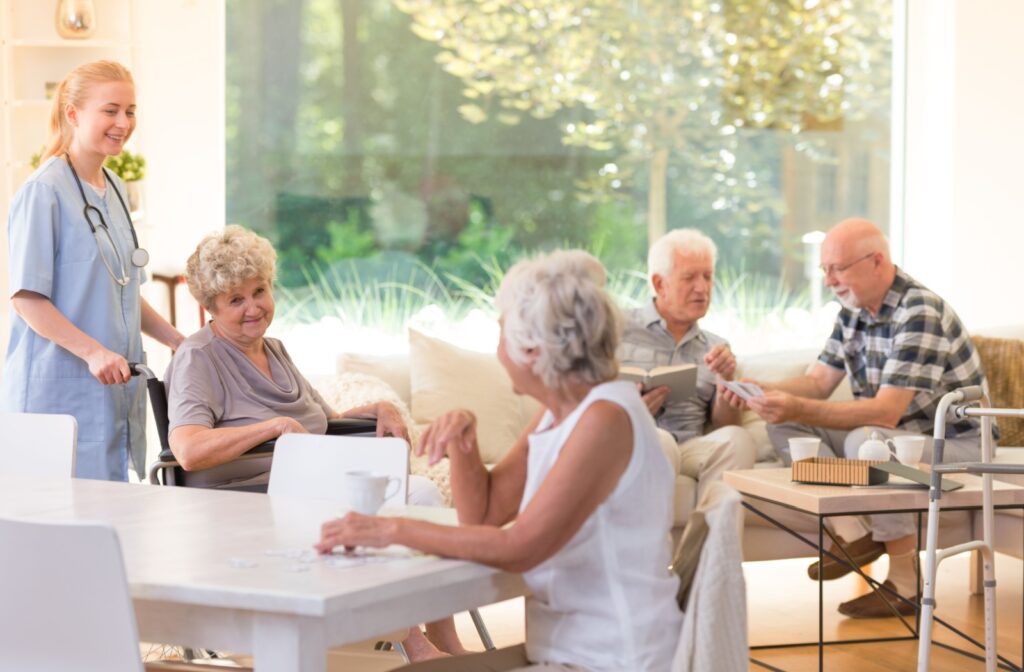Key Takeaways
- Struggles with bathing, dressing, and grooming often signal a need for more daily support.
- Medication management errors increase health risks and may require professional oversight.
- Home safety concerns, including falls, clutter, and missed repairs, are common warning signs.
- Nutrition challenges, such as skipped meals or weight loss, point to declining independence.
- Caregiver stress is just as important. You’re only human, and it’s okay to recognize that you have limits.
When Is It Time for Assisted Living?
Changes in daily routines happen gradually. A person may miss a medication dose, skip a meal, or stop taking care of their home properly. These aren’t minor problems—they can lead to everyday changes that reduce your loved one’s quality of life. So, how can you tell if it’s time for assisted living?
If you notice your loved one struggling with their daily tasks, it’s likely time for assisted living. Watch for changes in their physical health, cognitive health, and social habits. These are often the first changes that show the need for more professional care.
Changes in Habits, Routine, and Hygiene
When your loved one starts struggling with basic daily activities, don’t ignore it. These activities—things most of us do without thinking—become increasingly difficult with age. As mobility, strength, and cognitive abilities change, new problems develop over time. So, by learning to recognize problems, you can identify when someone needs more help.
1. Bathing and Personal Care Difficulties
You might notice that your loved one is bathing less frequently or seems to avoid showering altogether. Getting in and out of the tub or shower can become risky, especially if balance or mobility is an issue. Poor personal hygiene often signals that these tasks have become too challenging to manage independently.
2: Dressing and Grooming Struggles
Simple tasks like buttoning shirts, tying shoes, or putting on socks can become frustrating obstacles. Your loved one might start wearing the same outfit for days or choose clothing that’s inappropriate for the weather. Grooming tasks like brushing teeth, combing hair, or shaving might be neglected when fine motor skills decline.
Medication Management Issues Arise
Medication errors can have serious consequences, and they’re surprisingly common among seniors managing multiple prescriptions. When you start noticing mistakes with medications, it’s a clear sign that your loved one could benefit from professional care.
3: Missing Doses or Taking Wrong Amounts
You might find pill organizers that haven’t been filled correctly or notice your loved one has too many or too few pills remaining. Taking double doses because they forgot they already took their medication can lead to worsening health conditions or emergency situations.
4: Confusion About Prescription Instructions
Complex medication schedules become harder to follow when memory or cognitive function declines. Pills may look similar, or the fine print on labels could be challenging to read. This can lead to missed doses, which poses significant problems.
Home Safety & Maintenance Problems
A safe, well-maintained home environment becomes harder to manage as physical abilities change. When basic home maintenance starts falling behind, it can create dangerous living conditions that put your loved one at risk. This is why fall prevention is such a large priority in senior living communities.
5: Neglected Household Chores
You might notice that housekeeping tasks like vacuuming, doing laundry, or washing dishes aren’t getting done regularly. Clutter might be accumulating in walkways, which creates tripping hazards throughout the home. These changes are often gradual, so they’re easy to overlook.
6: Home Repairs Going Unaddressed
Minor repairs that would normally be handled quickly start piling up. As physical and cognitive abilities change, daily responsibilities add up. This creates all kinds of risks for seniors. They may be vulnerable to home repair scams or pay for unnecessary work, as well as struggle with staying safe in their home environment.
7: Fall Risks & Mobility Concerns
Changes in balance, strength, or vision increase the risk of falls at home. You might notice your loved one using furniture or walls for support while walking, or they might have had recent falls or close calls. Stairs become particularly dangerous, and navigating between rooms safely becomes more challenging.

Nutrition & Meal Preparation Challenges
Proper nutrition becomes more challenging when shopping, cooking, and eating become difficult tasks. Poor nutrition can quickly impact health and energy levels, and this creates a cycle that makes managing other daily activities even harder.
8: Difficulty with Grocery Shopping
Transportation to the store, navigating crowded aisles, or carrying groceries might become too physically demanding. Your loved one might rely heavily on convenience foods or have very limited groceries in the house. They might also become targets for grocery delivery scams or struggle with online ordering systems.
9: Weight Loss or Poor Eating Habits
Unintentional weight loss is often a sign that nutrition needs aren’t being met adequately. Your loved one might skip meals regularly or rely on snack foods instead of balanced meals. Changes in appetite, difficulty chewing or swallowing, or forgetting to eat can all contribute to poor nutrition.
When Your Loved One Needs More Care Than You Can Provide
Sometimes, a senior’s need for care can put additional stress on your family. This is entirely normal—you’re only human, and you can’t be expected to handle every responsibility yourself. Recognizing your family’s living isn’t about giving up, but about realizing that your loved one needs more support than you can reasonably give.
10: Medical Needs Require Professional Support
Some health conditions require specialized knowledge or round-the-clock monitoring that family caregivers aren’t trained to provide. Complex medication regimens, medical equipment management, or conditions that require frequent health monitoring might be beyond what you can safely provide at home.
11: Doctor Recommendations for Higher Level of Care
Healthcare providers might suggest that your loved one needs more support than they’re currently receiving. After hospital stays, doctors sometimes recommend assisted living to prevent readmissions. Medical professionals can see patterns and risks that family members might miss, and their recommendations should always be taken seriously.
Taking the Next Steps Toward Assisted Living
These signs all indicate that your loved one would benefit from a move to assisted living. With the right community at your side, you can help your loved one reduce these risks and stay safe in their everyday life. Your loved one deserves a safe and comfortable place to call home—a place like ours here at Arbor Oaks Senior Living.
If you’re considering assisted living for a loved one, we can help. We’d love to show you how our assisted living community can provide the safety, social connection, and peace of mind your family is looking for. Schedule a tour with us today to learn more about how we can support your loved one’s journey toward a more secure and fulfilling lifestyle.


